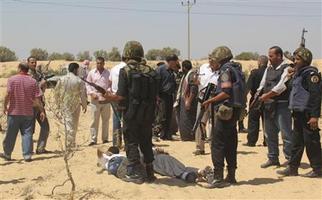
A fourth was wounded in an attack on their car in the suburbs of El Arish.
Egypt launched an offensive against militants in Sinai following the killing of 16 policemen on the Egyptian-Israeli border August.
Security in the area has deteriorated since the fall of Hosni Mubarak in February 2011, with Islamists appearing to gain a foothold, analysts say.
"Armed men who might belong to a jihadist group attacked a police vehicle and fired on its passengers before fleeing," a security source was quoted as saying.
Two policemen and a soldier were killed and another police officer was wounded, Egypt's interior ministry said. Security forces threw a cordon around the city in a bid to capture the gunmen, the AFP news agency reports.
Troop build-up
Egypt launched "Operation Eagle" in early August, sending thousands of troops backed by tanks and heavy equipment into Sinai.
They were responding to the killing of 16 policemen in a raid on their base near the Rafah crossing with Gaza Strip, not far from El Arish.
It was the deadliest and most brazen attack against Egyptian troops in the Sinai region for decades.
After killing the soldiers, the militants crossed the border with Israel in an apparent attempt to carry out another attack. However, they were killed in Israeli air strikes.
The build-up of Egyptian troops and heavy weapons in Sinai has caused concern in Israel.
Since 1982, when Israeli troops withdrew, Sinai has remained under a special security regime mandated by the peace treaty the two countries signed in 1979, which restricts Egypt's freedom of military action. Egyptian President Mohammed Mursi has stressed that there is no cause for concern, maintaining that his country is committed to all international treaties.
http://www.bbc.co.uk/news/world-middle-east-20192613
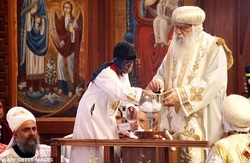
Bishop Tawadros has been chosen
as the new pope of Egypt's Coptic Christians, becoming leader of the largest Christian minority in the Middle East.
His name was selected from a glass bowl by a blindfolded boy at a ceremony in Cairo's St Mark's Cathedral. Three candidates had been shortlisted.
The 60-year-old succeeds Pope Shenouda III, who died in March aged 88. He succeeds as attacks on Copts are on the increase, and many say they fear the country's new Islamist leaders. The other two candidates were Bishop Raphael and Father Raphael Ava Mina. They were chosen in a ballot by a council of some 2,400 Church and community officials in October.
'In God's hands'
Their names were written on pieces of paper and put in crystal balls sealed with wax on the church altar.
A blindfolded boy - one of 12 shortlisted children - then drew out the name of Bishop Tawadros, who until now was an aide to the acting leader, Bishop Pachomius. Bishop Pachomius then took the ballot from the boy's hand and showed it to all those gathered in the cathedral.
Many leading Copts believe the new pope should play a less overtly political role. Activists hope that ordinary Copts can make their voices heard by winning more seats in the now democratically elected parliament.
Yet the new pope may want to make his views known quickly on how prominent a role Islamic, or Sharia, law should play in the new constitution currently under negotiation.
So from this ancient ritual, some very modern problems face Egypt's new Coptic pope. Strict measures were in place to make sure there was no foul play during the televised ceremony: the three pieces of paper with candidates' names were all the same size and tied the same way. Copts say this process ensures the selection is in God's hands. Bishop Tawadros will be enthroned in a ceremony on 18 November.
The new pope has studied in Britain, and has also run a medicine factory, the BBC's Jon Leyne in Cairo reports.
He is a man of broad experience and with managerial skills, our correspondent says, adding that he will need all those talents to lead the Copts as they face an uncertain future in a country now debating the role of Islam following last year's revolution.
Our correspondent says no-one in Egypt expects the new pope to introduce radical changes to the deeply conservative church. Pope Shenouda died in March. Under his leadership, the Coptic Church expanded significantly, including outside its traditional Egyptian base. He was a passionate advocate of unity among the Christian churches, and also clashed with then President Anwar Sadat, particularly over their conflicting views on the future of Egypt's relationship with Israel. Coptic Christians have long complained of discrimination by the Egyptian state and the country's Muslim majority.
But when President Hosni Mubarak was ousted last year and succeeded by the Muslim Brotherhood, their fears grew. In October 2011, 25 people died in clashes with the security forces after a protest march in Cairo over the burning of a church.
http://www.bbc.co.uk/news/world-middle-east-20192922
Student#: 1355088
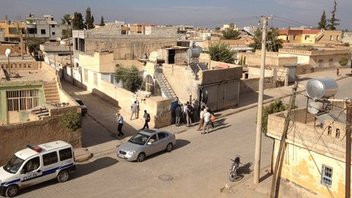
Student#: 1355088
Turkey has renewed firing at targets inside Syria after two women and three children were killed by shelling from across the border on Wednesday.
Several Syrian troops were killed by Turkish fire, a UK-based Syrian activist group said.
Syria says it is investigating the shelling in the town of Akcakale.
The Turkish parliament is discussing authorising troops to cross into Syria. But government sources say Turkey is not planning to declare war on Syria.
A government official said the retaliatory shelling - now in its second day - was only a "warning" to the authorities in Damascus.
The UN Security Council is to meet later, following a Turkish request for the body to take "necessary action" to stop Syrian "aggression".
Nato has held an urgent meeting to support Turkey, demanding "the immediate cessation of such aggressive acts against an ally".
The US, the UK, France and the European Union have already condemned Syria's actions.
Russia, which is allied to President Bashar al-Assad's government, has asked Damascus to acknowledge officially that the cross-border attack was "a tragic accident" which will not happen again.
In Syria itself as many as 21 members of Syria's elite Republican Guards have been killed in an explosion and firefight in the Qudsaya district of Damascus, the UK-based Syrian Observatory for Human Rights told the BBC.
'Abominable attack'
Turkish security officials said Turkey resumed artillery strikes on Syria early on Thursday, targeting the Tall al-Abyad district, some 10km (six miles) inside the Syrian border.
Turkey's territory has been hit by fire from Syria on several occasions since the uprising against Mr Assad began, but Wednesday's incident was the most serious.
Ankara's response marks the first time it has fired into Syria during the 18-month-long unrest there.
The office of Turkey's Prime Minister Recep Tayyip Erdogan said on Wednesday that Turkey would "never leave unanswered such kinds of provocation by the Syrian regime against our national security".
Parliament in Ankara is meeting in an emergency session in response to a government request for the military to be authorised to launch cross-border operations.
Akcakale has been fired on several times over the past few weeks.
Residents have been advised to stay away from the border, and more than 100 schools have been closed in the region because of the violence in neighbouring Syria.
Syrian government forces are attempting to cut rebel supply routes by winning back the border crossing at Tall al-Abyad which the rebels seized last month.
Syria's Information Minister Omran Zoabi offered Damascus's "sincere condolences to the families of the victims and to our friends the Turkish people".
Without admitting the shelling, Mr Zoabi said: "The border with Turkey is long, illegal arms trafficking takes place along the border and armed groups move along the border."
Syria, he said, respected the sovereignty of neighbouring countries.
Wednesday's attack is believed to be only the second time that people have died as a result of violence spilling over the border from Syria into Turkey.
Two Syrian nationals were killed on Turkish soil in April by stray bullets fired from Syria.
The BBC's Jim Muir in Lebanon says Ankara is not interested in a confrontation and will keep its retaliation to a minimum.
The Turkish armed forces have in the past moved into northern Iraq in pursuit of Kurdish militants who had bases there.
Source: http://www.bbc.co.uk/news/world-middle-east-19822253
Student#: 1355088
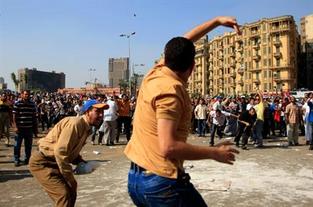
Student#: 1355088
Fresh clashes have broken out in the Egyptian capital Cairo in the worst violence since President Mohammed Mursi took office at the end of June.
Scores of people were reported injured as supporters and opponents of Mr Mursi fought in Tahrir Square.
Tensions are high after Egyptian judges criticised Mr Mursi's attempt to remove the country's top prosecutor.
It follows the acquittal of 24 people accused of attacks on protesters during last year's uprising.
Witnesses said a rally critical of the president was taking place in Tahrir Square on Friday when a crowd of his supporters stormed their stage.
Fighting broke out and protesters pelted each other with stones, bottles and petrol bombs.
The Health Ministry put the number of injured at 110, state TV said.
"My conclusion is that Mursi is just the president of the [Muslim] Brotherhood, that's all," said one protester, Sayed al-Hawari.
Another, Rania Mohsen, said: "We are here against turning the state into a Brotherhood state. We do not want to replace the old regime with one like the old one."
However, Mursi supporter Moez Naggar accused the other camp of behaving like "thugs".
"We have to give Mursi a chance," he said.
As darkness fell at least two buses, believed to belong to the Muslim Brotherhood which backs Mr Mursi, were seen on fire near the square.
An urgent screen caption on Egypt's state-run Channel 1 TV read: "Muslim Brotherhood group denounces regrettable incidents in Tahrir Square, calls on its members to withdraw from the square."
In unrest elsewhere, protesters in Egypt's northern industrial town of Mahalla stormed the headquarters of the Muslim Brotherhood and tore down pictures of President Mursi, security officials told BBC Arabic.
The BBC's Jon Leyne in Cairo says that, 100 days into his term, this is the first time President Mursi has experienced big demonstrations against him.
However, it is not clear how much it represents wider discontent with the Muslim Brotherhood and the government, he says.
Egyptians are frustrated that so far the new president appears to have done little to change the country or boost the economy, our correspondent adds.
Opponents are also angry at Egypt's proposed new constitution, which they see as too dominated by Islam.
Angry response
Earlier, a group of Egyptian judges criticised President Mursi's attempt to remove the country's top prosecutor as a "farce".
The president said he was reassigning Prosecutor-General Abdel Maguid Mahmoud - regarded as a figure from the era of ousted President Hosni Mubarak - as Vatican envoy.
Mr Mahmoud is refusing to go.
The move against Mr Mahmoud followed an angry public response to the acquittal of the 24 people who had been accused of sending men on camels and horses to break up a protest in Cairo in 2011, leaving several people dead.
Those accused included Fathi Sorour and Safwat al-Sherif, former speakers of Egypt's two houses of parliament.
Prosecutors said Mr Sherif, who was also the secretary general of Mubarak's National Democratic Party (NPD), had "contacted MPs, members of the NDP and financiers of the party, inciting them to disperse the protests in Tahrir Square by force and violence".
The case is the latest flashpoint between Mr Mursi's government and figures associated with the Mubarak era.
Source: http://www.bbc.co.uk/news/world-middle-east-19928452
Student#: 1355088
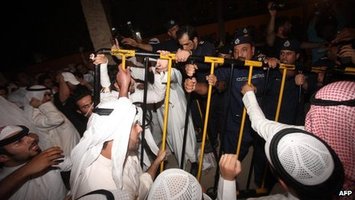
Student#: 1355088
Several protesters were hurt and others detained when protesters clashed with security forces outside Kuwait's parliament building, reports say.
At least 5,000 people took part in the demonstration on Monday evening.
In an address that surprised observers, ex-MP Mussallam al-Barrak warned the emir he would not be allowed to "take Kuwait into the abyss of autocracy".
The opposition fears the government will try to alter legislation before upcoming parliamentary elections.
The emir, Sheikh Sabah Al Sabah, dissolved the National Assembly earlier this month after the emirate's highest court rejected a government appeal aimed at changing electoral boundaries.
The government said it wanted to safeguard the outcome of future polls; critics said it planned to alter the boundaries to its advantage.
'We will not allow you'
On Monday, thousands of Kuwaitis defied a request by the authorities not to participate in the anti-government demonstration in Kuwait City.
Witnesses said at least five people, including the son of the prominent opposition figure Ahmed al-Saadoun, were detained when demonstrators clashed with security forces manning barriers outside the National Assembly building in Erada Square.
Several people were also reportedly hurt in the skirmishes.
Earlier, demonstrators listened to a speech by Mussallam al-Barrak which many observers said was striking in its criticism of the 83-year-old emir.
"We will not allow you, your highness, to take Kuwait into the abyss of autocracy," he warned. "We no longer fear your prisons and your riot batons."
"If your highness decides to change the election law by emiri decree, then you alone are responsible for complicating matters and you alone are responsible for resolving it."
His remarks drew repeated chants of "We will not allow you, we will not allow you" from the crowd.
The dispute began in June, when the Constitutional Court declared illegal February's elections, in which the Islamist-led opposition made significant gains. The court reinstated the previous parliament.
Last year, protesters stormed the parliament building when the government tried to prevent former Prime Minister Sheikh Nasser al-Mohammed al-Sabah facing questions about the alleged payment of bribes to pro-government MPs. Sheikh Nasser and his cabinet resigned the following month, triggering February's elections.
Opposition leaders have called on the emir to announce a date for the upcoming parliamentary elections. Under the constitution, they must be held within 60 days of the dissolution of the National Assembly.
Source: http://www.bbc.co.uk/news/world-middle-east-19964068
Also, if you wish, you can add a YouTube video or a picture.
Please include links to the original news story.
 RSS Feed
RSS Feed